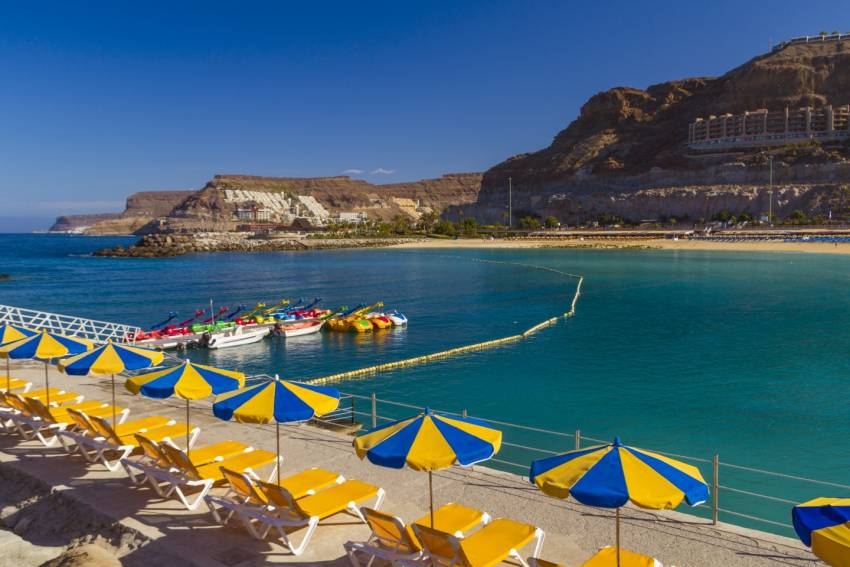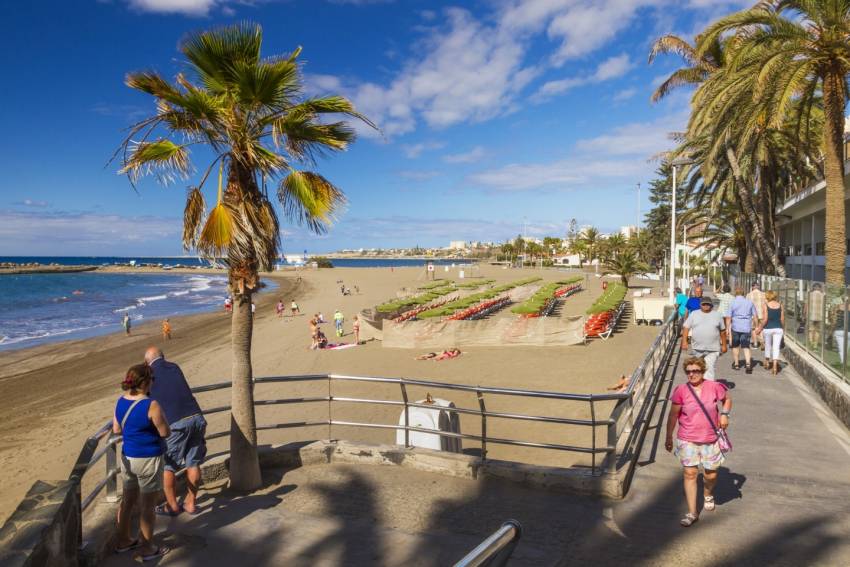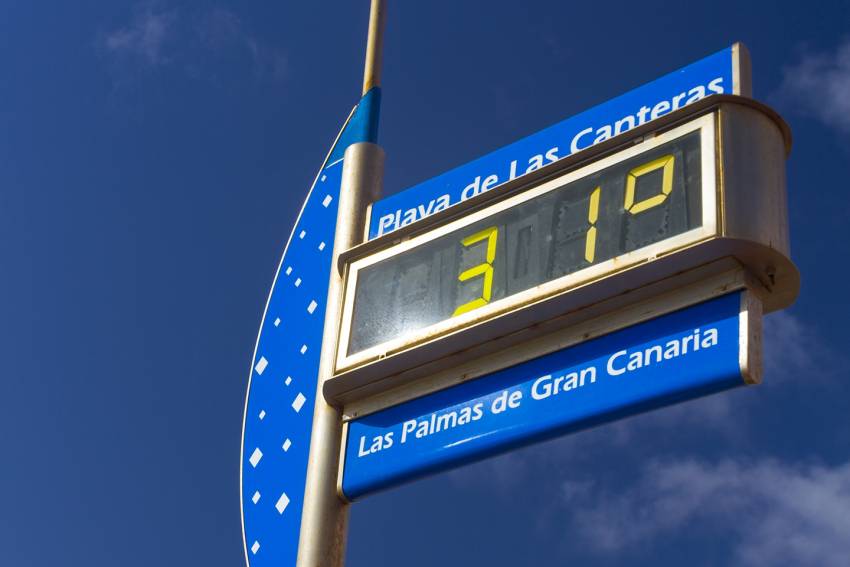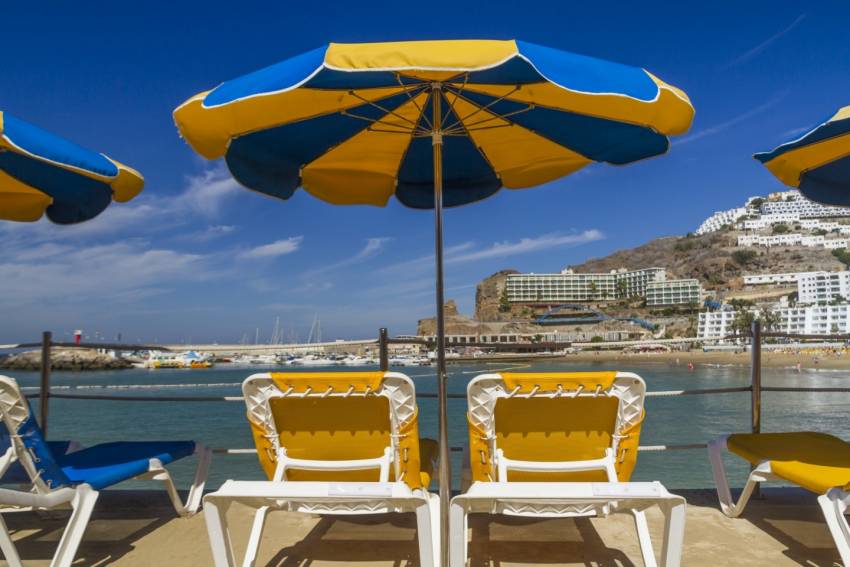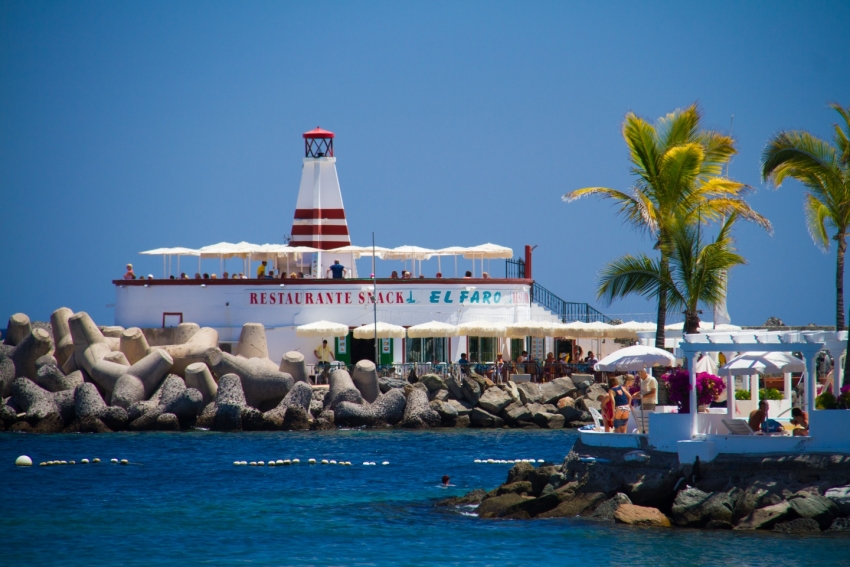Balmy! Gran Canaria Weather in February
Gran Canaria in February is the land that winter forgot. The average daily high temperature is 21ºC but it can be as warm as 27ºC on the beaches. The average minimum is 15ºC but this is always late at night. Gran Canaria gets an average of three days rain every February.
February is a great month to visit Gran Canaria because it’s one of the only places in Europe where the sunshine is virtually guaranteed (the other places are the other Canary Islands). The weather can be variable in Gran Canaria in February but if you come for a week you'll get sunny days.
February is prime walking season in Gran Canaria because the mountains start to turn green and the first flowers come out. You need layers and a wind cheater just in case the clouds roll in: It gets cold in the mountains, even in Gran Canaria. You may even see a dusting of snow right at the top!
For sunbathing the beaches are warm in February and the sun shines almost every day. It’s hot enough for lying on the sand between 10.00 and 16.00. The average water temperature is 19ºC: Warm enough for a dip when the sun is out. Sheltered beaches like Mogán, Amadores and Puerto Rico tend to have warmer water, even in winter.
February in Gran Canaria tends to be like all the other months in Gran Canaria: Hot and sunny. Just bring a jumper for the odd cool day and for the evenings. Enjoy the sunshine!
Gran Canaria Weather in January: Winter What Winter?
Gran Canaria in January is about as far from winter as you get in Europe. The average high temperature is 21ºC but it often reaches 25ºC on the beaches and in the resorts. The average low temperature is 15ºC (in the middle of the night). That’s as ‘cold’ as Gran Canaria gets!
The island gets an average of just three days rain during January but we have to say that every few years a big storm comes through and we get a few wet January days in a row.
You can sit on the beaches during January between 10.00 and 16.00 and by a sheltered pool for longer. In the evenings take a fleece or a jumper as it feels cool when you sit outdoors.
These figures are from the coast. The interior of Gran Canaria in January is a different world. It snows very few years and frost does happen above 1500 metres at night. Even on sunny days it gets cold in the Cumbres so take layers when you visit. January is a great time to visit the Gran Canaria mountains because all the almond and fruit trees are in blossom.
For a January sunshine holiday Gran Canaria is an ideal destination. It’s sunny most of the time and there is plenty to do on the odd cloudy day. See you on the beach!
The Truth About Temperatures in Gran Canaria
Weather forecasts and especially temperature predictions are often wrong in the Canary Islands and here's why.
The Weather in Gran Canaria's Resorts
Gran Canaria’s resorts, clustered along the south coast, get the most sunshine on the whole island. They are sheltred by the rest of the island and exist in a permenant bubble of blue sky.
If you come to Gran Canaria for a week’s holiday you are virtually guaranteed plenty of sun. With minimum winter temperatures over 20ºC they are the best place in Europe for topping up your winter tan.
Playa del Inglés Weather
Even when Gran Canaria’s mountains are covered in cloud Playa del Inglés is sunny. The clouds seem to burn off when they float over the Maspalomas sand dunes in front of the resort.
Minimum temperatures during the day never drop below 20ºC and rarely rise above 33ºC. Combined with the sunshine this makes Playa del Inglés a fantastic sunshine destination all year round.
For more on Playa del Inglés click here for our resort guide.
Maspalomas Weather
With it’s enormous beach and dune system Maspalomas has its own microclimate. The hot air rising from the dunes keeps the clouds off the resort and blue is the default sky colour. You can sunbathe all year round on the beach and the water is warm enough for a dip even in the winter.
Maspalomas is the Gran Canaria’s flattest resort so it does sometimes get windy on the beach. If the palm trees are swaying back and forth take a windbreak, head to sheltered Meloneras Beach at the end of the promenade, or just stay by the pool for the day.
Like the sound of Maspalomas? Click here for our resort guide.
Mogán Weather
Mogán is the prettiest resort on the island and the weather is dreamy too. It’s as sunny as it gets anywhere in Europe with 320 days per year of sunshine and is rarely windy. For the absolute best chance of getting a winter tan, Mogán is your spot.
For more on Mogán, click here.
Puerto Rico Weather
Puerto Rico is a couple of days short of being the sunniest spot in Gran Canaria behind Mogán but is still basically set to ‘permanent sunshine’. With the beach, a short walk from all the accommodation, and with stunning Amadores beach just around the headland, Puerto Rico is the sunbather’s resort.
Click here for our Puerto Rico guide.
San Agustín Weather
San Agustin gets the blue skies and hot sun of Maspalomas without the crowds. The beaches are stunning but can be windy. If you get a blowy few days head along the promenade towards Maspalomas. The sheltered beaches along the way, like Las Burras, don’t get the gusts.
Click here for our Puerto Rico guide.
Las Palmas Weather
Gran Canaria’s capital city is tucked up in the north east of the island and has much more varied weather than the resorts. It still gets seven hours of sunshine per day on average, but cloudy days are more common. During July and August Las Palmas is often cloudy due to the Panza de Burro or Donkey Belly cloud that lingers over the city.
During the winter, Las Palmas gets plenty of sunshine and is an excellent spot for a city break that includes tanning time on the beach along with great nightlife and culture.
For more on Las Palmas, click here.
The Cumbres Weather
Most of the real weather in Gran Canaria happens up in the mountains or Cumbres. In the winter the very top gets frost and even snow. Even in the summer it can be chilly in the mornings and evenings and in winter it gets bitingly cold if the clouds are low down.
The weather up top changes by the hour. Take a windcheater and a couple of extra layers if you plan to walk about. We can’t tell you how many times we have seen poor tourists in shorts shivering away up there. They always say the same thing: “Nobody told us it gets cold in Gran Canaria”.
Gran Canaria Info recommends:
- Default
- Title
- Date
- Random

